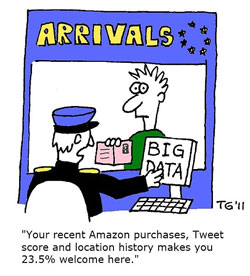Big data is here... And gone...
Big data isn't it
But, says Craig Stephens, Solutions Manager: Information Management, SAS South Africa, the silver bullet for business is not big data; it is big data analytics. 'Analytics is the business answer to big data. When we say analytics we do not mean a statistical analysis of the past, but about predicting outcomes. Regardless of the technology, the focus is on value and it's about closing the gaps in the decision life cycle of a business and having the appropriate tools.'
For example, the value of analysis of big data in marketing it can inform you of brand sentiment, target the right customers and/or how a product is perceived. In transport companies it can, by tapping into live feeds, understand the weather and so save time and money, by, for example, by taking a different route. Governments can utilise analytics to ensure better road and traffic planning. Personal insurance can tap into sources of information to determine how risky a person is and personalise their insurance, benefiting the insurance company and the consumer.
For Stephens there is nothing wrong with a big data management strategy where data is received and a platform established, with some analytical modelling that is then published to its offices. 'But there is nothing agile about this. The processes must be in place to access the data quickly.'
Gary Hope, Data Platform Technical Specialist and Laura Kotlinski. MEA Solution Specialist, Microsoft South Africa both say that the driving force should be how can we transform business operations to derive value? Technology is cheap and easy to deploy, but we need to define the business problem to use the technology to solve the problem. 'The traditional approach was to let the data do the work. Now you need to process the data and define the way you want to interact with it.'
Velocity is key
The more information, the more insight, the better are the decisions made for your business. The business environment is shifting. People are making decisions based on data that is affecting their business. We are using new technologies to solve problems we previously thought we could not. Simon Jeggo, Senior Industry Business Value Consultant, IBM Software Group says 'The key is velocity or when we process the data. If someone is trying to empty my bank account, I need to know now! Not an hour later. That is velocity.'

Time is important and there is no point if it takes days to understand a problem. 'You need real-time analytics that kicks off 15 minutes after someone has sent a tweet. Data analytics is needed everywhere and in every industry,' says Hope.
Aligning big data
If the focus is on the value big data analytics provides for business, then big data initiatives must be aligned with specific goals.
According to Boikanyo Victor Botlhokwane, Principal Consultant, Oracle, big data should be seen as an extension of your overall information architecture. Simplify and standardise your IT operations to get economic advantages.
There needs to be a centralised IT strategy, and standards and governance. 'If you have a mature model why implement a new model. Marry it with what you already have. Big data is not the other child in the organisation, but an extension of your existing data management strategy within your organisation.' He also advises correlating your big data with your structured data (data already existing in the organisation) and use it to derive insights. Integrate siloed data sources within the company. 'This allows you to capture a unified view of your customer data,' he says.
He adds that your environment must be dynamic, especially IT environment. It must be able to move quickly; and a well-planned cloud strategy is important and can propel you to get your big data initiatives out there fastest.
For proper big data to take place, proper infrastructure must be in place he warns. 'You do not want your infrastructure to buckle, but there is also no need to start from scratch with big data infrastructure. Identify what hardware and software is needed.'
He advises using a phased approach can be used with initial small-scale pilot projects to test the waters. 'Identify one desired data set, capture it, explore new data management technologies, and determine integration points with existing data. It is easier to grow a pilot into a full-blown project.'
In this way, you are also not disrupting the business and its processes while you are doing this but you are yielding results. 'As [soon as] these projects are successful, they can be taken back into the business. This approach lets enterprises realise the benefits of the leverage in big data with minimal disruption to their business,' says Botlhokwane.
A 60% shortfall in big data skills is predicted by 2018 so Botlhokwane recommends building a data science team and establishing a centre of excellence to minimise training and risk. This is also useful for sharing solution knowledge planning artefacts oversight for projects.
Ask 10 people what big data is and you will get 10 different answers, but the fact remains that by next year already organisations that tap into their data will outperform their competition by more than 20%*. Big data is not about technology, it is about you and what you want it to mean.
*Gartner, Regina casonto et al.
About Danette Breitenbach
- Sabre EMEA 2024 Awards: Razor PR, Retroviral top SA agencies - 18 Apr 2024
- McKinsey restructures, 3% of workforce to go - 15 Apr 2024
- SpendTrend 2024: Resilient South Africans adapt to challenging economic conditions - 9 Apr 2024
- Albany Bread Girl joy sours to disappointment for content creator and brands - 5 Apr 2024
- 7 South African PR agencies on Provoke Media 2024 EMEA campaign shortlist - 27 Mar 2024
View my profile and articles...